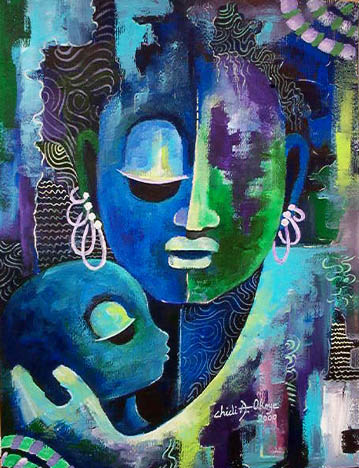
Image source: "Blue Mother" by Chidi Okoye - http://www.chidi.com/
Motherhood has increasingly become the focus of popular culture on social media, where the long-held beliefs about mothers and motherhood are hotly debated.
Understanding motherhood, and taking a critical stance toward the various social expectations and psychological changes and challenges motherhood engenders, has become quite topical. For example breastfeeding in public is currently under great discussion in the USA, with Virginia becoming the 48th US state to make legal provision for public breastfeeding. Even Pope Francis has welcomed mothers to breastfeed in the Sistine Chapel. While these steps are positive and should be lauded, I cannot but acknowledge the reflexive shame experienced by mothers who do not breastfeed. Somehow whatever one group of mothers celebrate becomes a point of failure for the rest.
Shame is an emotion frequently expressed by mothers, though usually in hushed tones and only in trusted company. Jane Ribbens touched on this in her autobiographical discussion of Motherhood entitled ‘Hearing my Feeling Voice’, where she describes her relief at reading about other mothers’ accounts of struggling to get their four year olds off night nappies! She points to the frequently vast divide between popular psychology parenting ‘manuals’ and the lived experiences and views of mothers. The ‘shoulds’ and ‘musts’ and implicit judgment inherent in these ideas and theories fall upon the primary caregiver, who is frequently the mother.
Feminism is tasked with building a supportive environment that includes mothers, as envisaged by Ann Snitow back in 1992. Currently there is certainly greater awareness of the different aspects of motherhood, and increased acceptance of different approaches to motherhood; however women continue to bear shame and guilt at not meeting the standards of excellence set for mothering.
Evaluations begin prior to conception – when women are judged harshly for not living a lifestyle conducive to a healthy pregnancy – even before they are aware that they are pregnant or even planned to fall pregnant. It is the woman who bears the scorn and reproach when she chooses not to embrace motherhood, but instead to terminate an unwanted pregnancy. It is the mother who bears the unspoken (or expressed) blame at bearing a child with physical or psychological developmental delays. It is also the mother who carries the weight of the ultimate decision to continue with a pregnancy when antenatal tests have confirmed severe fetal deformity, or to undergo feticide and late termination of pregnancy.
Pregnant women are expected to revel and glow in the experience of pregnancy – often hiding their feelings of anxiety and depression from those closest to them. Judgment increases exponentially once the type of delivery is discussed, with planned caesarean-sections carrying the harshest criticism and only painkiller-free vaginal births being termed ‘natural’…. Even before the baby is born, the mother is weighed, measured and found lacking in the very basics of becoming a mother. Not surprising then that prenatal mental health and self-esteem of women impacts on the prevalence of postnatal depression (Martini et al, 2015).
What if a mother was empowered to trust herself – to accept her own voice as the one that matters most? What is she threw off the cloak of shame at failing to attain unattainable standards? Would this not result in a radical shift in the power imbalance between ‘just a mother’ and medical, educational and psychology professionals? Certainly this would have a rather dampening effect on the consumption of self-help mothering publications and a rather disappointing shift toward ‘mother really does know best’. What if mothers were allowed in on the secret that there is truly no one golden standard by which motherhood can be measured? It is, as with most of life, an experience of opposites. Bliss and love thrash against feelings of loss, fears and existential angst.
Being a mother means providing the best care for your child as is possible for you within your unique circumstances. In South Africa the best care that many mothers are able to provide is a less than minimum wage income, or sharing crowded housing with extended family members. Being a good mother is a relative term, dependent largely on your income, social support, education and mental and physical health. Being a mother and how to mother are both exquisitely personal choices. Each mother constructs the meanings attached to her own experiences of motherhood. Jennifer Baumgardner and Amy Richards explored feminism and motherhood 15 years ago. Sadly much of what has been written remains rhetoric and theoretical debate, rather than having changed the daily reality of women and mothers. Where should this change start? With women. With men. With mothers. Each in our own way. Each accepting the differences between us and embracing the freedom to be the mothers we can, and our children need us to be.
’Unwrapping motherhood from the swaddles of patriarchy means that we will no longer have to work so hard to be different from our mothers. As it is, we are more likely to notice what our mothers are doing wrong than what they are doing right.’ (Baumgardner & Richards, p208).
By Angie Vorster
References:
Baumgardner, J. & Richards, A. (2000). Manifesta: young women, feminism and the future. New York: Farrar, Straus and Giroux.
